The word “shame” traditionally carries significant weight in our society. Great shame was placed on people historically for not working hard enough or taking care of their family or acting in ways that societal elites saw as negative. How many times have we heard or probably even said “you should be ashamed of yourself”, “that’s a shame”, “crying shame”, or “put them to shame”. One could make a case that, in many respects, America was built on shame.
In this light, it should make some sense that shame plays a large part in many, or even most, people’s lives. Shame can be a great motivator for people, even if it is for the wrong reasons. Fear of being criticized or ostracized from a family or community can be the impetus for many of our accomplishments in life. It can also be the impetus for feelings of inferiority, depression, and even suicide in many cultures.
What is emotional shame at its root? Shame is defined in many slightly different ways but we at psychdomain.com prefer to define shame as a fundamental feeling as a person that you are not worthy of being appreciated by others. It is typically a basic feeling of inadequacy but, in extreme cases, is an overall feeling that you are “bad” or have few redeeming qualities.
When working with youth with severe mental health issues, shame is very often a major piece of the child’s presentation. As has been discussed in other posts on this site, our emotions are largely, if not entirely, brought about by our interpretations of events in our lives. If we are not able to look at situations in a balanced, objective way and instead look at our every action through a lens of inadequacy, it is difficult, if not impossible, to find resolution to many of our problems.
It is in this light that we at psychdomain.com hope to invite you as someone who is a parent or on some level works with children to begin laying the groundwork to help the children, and adults for that matter, move their thinking from shame-based to guilt-based.
“What is the difference?”, you may ask. “Guilt” and “shame” are often used interchangeably in society as a whole. However, for our purposes here there is a very real distinction that can make all the difference in the world to someone who may be overwhelmed with shame in their everyday life.
In religious circles, there is sometimes a saying, “hate the sin but not the sinner”. Our basic distinction between guilt and shame uses that idea. People who look at their mistakes through a guilt-based lens are looking at the sin while people looking through a shame-based lens are focused on the sinner, themself in most cases.
Guilt, in our formulation, is the feeling we have when we do something that causes harm to another person. If a child is playing outside and accidentally breaks a window, appropriate guilt sees this as an isolated incident that we can learn from and move on from that does not have to damage our ability to feel we are a decent person overall. Then we can take responsibility for our actions and make the appropriate repair or restitution.
However, if we look at the same situation through a lens of shame we may see this as proof of our essential worthlessness or inability to do anything right, especially if peers or adults in our lives use this or other incidents to berate us or tell us how stupid or worthless we are. We are typically put on the defensive and look for ways to hide from responsibility or repair.
We at psychdomain.com believe it is never too early to begin helping our children or students learn this distinction and practice taking responsibility for our actions while being able to repair the damage we may have done to the best of our ability.
Please keep up with psychdomain.com for more ideas on how to help the children around you realize their potential. If you have a topic you would like to see us discuss, drop us a line and we will be glad to cover it.

